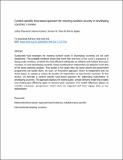| dc.description.abstract | Sustainable food strategies for meeting nutrient needs in developing countries are not well established. The available evidence shows that more than one-third of the world’s population is facing under-nutrition, of which the most affected individuals are children and mothers from poor countries. In most developing countries, losses resulting from malnutrition are between 3 and 16% of the gross domestic product. This burden is far larger than the donor-driven and government programmes can tackle alone. As such, an innovative approach, which is independent and not donor-based, is needed to reduce the burden of malnutrition in low-income countries. In this review, we describe a context specific food-based approach for addressing malnutrition in developing countries. The approach deploys the hybrid public–private delivery model that enables cost sharing and efficiency gains in resource-poor countries. The model influences players to consider consumers’ perspectives, which often are neglected and truly engage them as key stakeholders. | en_US |

